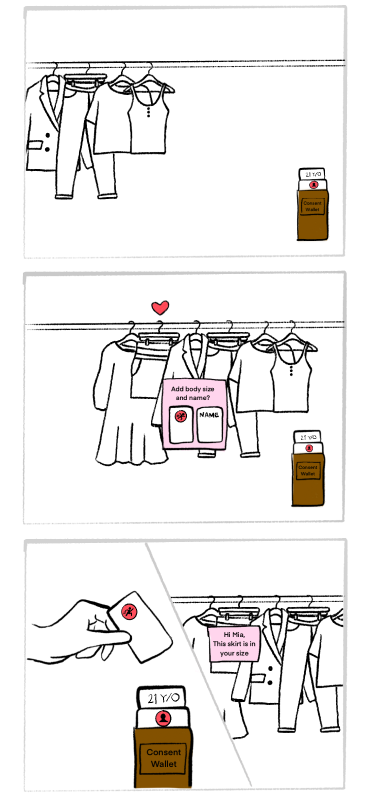How might we...
...help people overcome feelings of discomfort to provide accurate body measurements when creating an avatar?
This pattern is a co-created output a Design Jam which took place in Singapore on the subject of Data Transparency and Control in the Metaverse. During the Design Jam, six design teams created simple prototypes which helped deliver better transparency and control over data use in fictional services.
Bizverse is a platform and set of tools for companies to do business in the metaverse, providing services in industries such as retail, real estate and tourism. Their products are currently browser-based, with a roadmap to incorporate web3 and XR technologies in the future.
In the fourth season of the Singapore Accelerator, an ongoing research collaboration between the TTC Labs team at Meta and the Singapore Infocomm Media Development Authority (IMDA) and Personal Data Protection Commission (PDPC), Bizverse focused on their retail offering, a service that allows vendors to 3D scan their physical shop to create a virtual copy within the metaverse.
During the Design Jam, Bizverse set out to address the concerns that people may have over sharing potentially sensitive body-based data such as weight and body measurements while shopping for clothes in the metaverse. When people feel uncomfortable about providing accurate data they are more likely to provide false or misleading measurements, which can limit their shopping experience.
How might we...
...help people overcome feelings of discomfort to provide accurate body measurements when creating an avatar?
Measurement details:
Bizverse’s solution explores how incremental consent can be used when asking for potentially sensitive body-based data while clothes shopping within the metaverse.
Window Shopping Mode
Before the shopping experience begins, the user is asked if they are window shopping or engaging in ‘actual shopping’ to try on clothes for purchase. Window shopping mode will allow the user to browse items without sharing any body-based data, not penalizing them if they are hesitant to share personal data.
Persistent Data Status Updates
A notification of data being collected in real time is visible to the user at all times. This provides clarity and transparency over data collection, building user trust and confidence.
Data Explainers
At each instance of data collection a data explainer highlights what data is captured and for what purpose. This further supports user confidence and trust, empowering them to make informed decisions around privacy and consent.
Highlighting Data Security
When the user is asked to provide potentially sensitive data, a notification detailing the encryption and security measures securing the data collection appears. In highlighting the precautions taken to keep data safe, users are provided with increased confidence when asked to share personal data.

Bizverse used XR prototyping techniques to realize their solution, making use of props and sketches to demonstrate the spatial and physical dimensions of their prototype. The prototypes that were developed by Bizverse and the other participating companies were then used to synthesize learnings and insights which were distilled into UX design patterns for privacy interactions.
Bizverse’s solution was used as the basis for the Consent Wallet design pattern.
The Consent Wallet design pattern creates a physical place for users to store and share their personal data, leveraging the tactile and symbolic qualities of the object. Gathering all shareable data in the one place, the wallet provides a clear overview of a user’s personal data and allows them to share individual data types in-context and on the fly by physically removing specific data cards. In the demo video, the user is asked to provide sizing data which they then remove from their consent wallet and place on the notification.